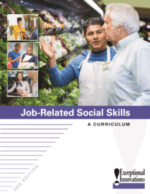Afterschool job clubs can be both instructive and fun for students. They provide an opportunity for older students to learn and practice important job skills while interacting with their peers. The afterschool job club may be offered to students who have work or internships during the day. But you also may include future workers because it is never too early to teach critical job-related skills. Even students who are too young for a job can benefit from “real-world” skill practice.
Good communication and social skills are necessary in the workplace because employees need to be able to get along with other employees, their employers, vendors, and customers. Students who have not developed communication and job-related social skills may not succeed in the workplace as a result. Identifying job-related social skills for development and practice can be an important service for older students.
Where do you start? Consider building several lesson activities around helping students develop job-related social skills.
Activity: Understanding Job Responsibilities
Understanding job responsibilities and communicating understanding to the job supervisor are basic social skills that transcend all jobs. For this skill, students will:
- Maintain eye contact with the person who is describing the job responsibilities.
- Use nonverbal communication, such as nodding or saying “okay,” to acknowledge they are listening.
- Ask questions or say that they understand to show they understand their responsibilities.
- Verbally repeat the responsibilities.
- Thank the supervisor.
Form a group of about 5 or 6 students in a semicircle. Introduce the skill by asking students what kinds of responsibilities people have at work. Make a list of their responses (e.g., getting to work on time, dressing appropriately, knowing what tasks to do, knowing how to do the tasks, knowing when to do the tasks, being on time, and so on).
Ask students the following:
- What will happen if they do not do these things? (e.g., they will be fired).
- Who tells them their responsibilities? (e.g., the boss).
- What should they do if they do not understand? (e.g., ask questions).
- How they will remember the information? (e.g., listen, organize, repeat, ask questions, write them down, make a list, etc.).
List the steps involved in understanding job responsibilities. Your list should include the following:
- Listen.
- Look at the person who is speaking.
- Nod your head or say something like “okay.”
- If you do not understand, ask questions.
- Repeat the responsibilities and then make a list of them to make sure you do not forget.
- Thank the supervisor.
Next, develop job responsibilities for several job situations (e.g., library worker, office worker, babysitter, newspaper delivery person, grocery store stock person, fast food worker, etc.). Have each student role play the supervisor describing the job responsibilities. Make sure each student has a chance to act out the steps.
Activity: Sharing Job Experiences
Group discussions can be beneficial, yet adolescents often need structure to participate fully.
One way to help adolescents structure their comments during a job club meeting is to use a questionnaire to organize their thoughts prior to discussing them. Surveys can be instructor-made (e.g., pose 2–3 thought-provoking reflective-type questions) or found in published materials, such as Job Related Social Skills: A Curriculum (3rd Edition). Sample survey questions may include the following:
- Describe a time when you successfully used one of the social skills that you learned.
- Describe a time (if there was one) when you were unsuccessful using one of the social skills. Why do you think you were unsuccessful?
- Describe any problems that came up at work.
- Describe one thing you did at work that you’re proud of.
For students with diverse learning needs, it may be helpful to use the same survey several times so that group members feel comfortable responding to the questions. Since there is always a learning curve with new surveys, using the same one several times enables group members to focus on their reflections rather than on understanding what is expected of them.
Learn More About Job Clubs and Job-Related Social Skills
 Job-Related Social Skills: A Curriculum (3rd Edition) is designed to develop the basic, foundational job-related social skills required across most employment areas. Instructors can use Job-Related Social Skills: A Curriculum to provide participants with these basics so that they have a step-up in getting and keeping a job. Learn more.
Job-Related Social Skills: A Curriculum (3rd Edition) is designed to develop the basic, foundational job-related social skills required across most employment areas. Instructors can use Job-Related Social Skills: A Curriculum to provide participants with these basics so that they have a step-up in getting and keeping a job. Learn more.

